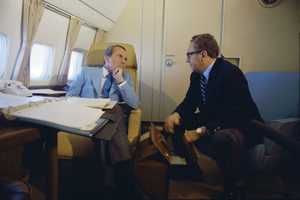Remarks at the Swearing In of Henry A. Kissinger as Secretary of State
President Nixon appointed Henry Kissinger as National Security Adviser early in his administration, where he played a crucial role in shaping U.S. foreign policy. As the Watergate scandal began to overtake the Nixon presidency, Kissinger’s influence expanded even further when, on September 22, 1973, he was sworn in as the 56th Secretary of State. He became the first person in American history to hold both the National Security Adviser and Secretary of State positions simultaneously. He was also the first foreign-born citizen to serve as Secretary of State, the nation's highest diplomatic office.

Born in Fürth, Germany, in 1923, the Kissinger family fled Nazi persecution with his family and immigrated to the United States in 1938. In his swearing-in remarks, Kissinger reflected on his journey from refugee to America’s top diplomat, crediting his background with shaping his understanding of freedom and justice.
And if my origin can contribute anything to the formulation of our policy, it is that at an early age I have seen what can happen to a society that is based on hatred and strength and distrust, and that I experienced then what America means to other people, its hope and its idealism.
Here are his remarks in full.
Remarks from Henry Kissinger at his Swearing in Ceremony for Secretary of State
September 22, 1973
Mr. President, the Chief Justice, distinguished guests:
Nearly 5 years ago, shortly after the President had been elected, he invited me to call on him at the Hotel Pierre in New York. I had never met the President at the time, and he described to me, in a conversation which eventually led to my appointment as his assistant for national security, what he hoped to achieve in his Presidency.
He told me that no goal could be more noble than to bring mankind closer to its eternal hope for a lasting peace. He said that we should not be hampered by any preconceptions, that we should not avoid any new departures, and that we should enlist the ablest people in the departments and in the country to help in this enterprise.
In the 5 years that have passed since then, we have gone through many turbulent times, but the objective has never wavered, and the major progress has been made in easing many of the tensions that existed in the world when the President assumed office.
A few weeks ago in San Clemente, the President spoke to me again about his hopes for his second term and asked me to assume this position, and he again stressed to me that the only objectives that are worth achieving in foreign policy are those that transcend administrations and go beyond parties, and he spoke to me then about the structure of peace.
When we speak of a structure of peace, we mean a world which has not just eased tensions, but overcome them; a world not based on strength, but on justice; a relationship among nations based on cooperation and not an equilibrium of forces alone. That kind of a world is the task, as the President has pointed out, of all Americans, and it is the reason why the President has charged me here with achieving it in the closest cooperation with the congress and with the great departments of the Government.
Mr. President, you referred to my background, and it is true, there is no country in the world where it is conceivable that a man of my origin could be standing here next to the President of the United States. And if my origin can contribute anything to the formulation of our policy, it is that at an early age I have seen what can happen to a society that is based on hatred and strength and distrust, and that I experienced then what America means to other people, its hope and its idealism. And therefore, in achieving a structure of peace under your leadership, Mr. President, we will strive not just for a pragmatic solution to this or that difficulty, but to recognize that America has never been true to itself unless it meant something beyond itself.
And as we work for a world at peace with justice, compassion, and humanity, we know that America, in fulfilling man's deepest aspirations, fulfills what is best within it.
Thank you very much.
***
The text of this speech is shared courtesy of The American Presidency Project.






